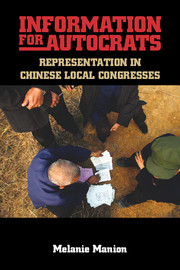Book contents
- Frontmatter
- Dedication
- Contents
- Tables and Figures
- Acknowledgments
- Introduction
- 1 Institutional Design
- 2 Selectoral Connection
- 3 Authoritarian Parochialism
- 4 Putative Principals
- 5 Independent Candidates
- Conclusion
- Appendix A Interviews and Surveys
- Appendix B Reliability Check on Delegate Self-Reports
- Appendix C Searching Independent Candidates on Sina Weibo
- Works Cited
- Index
- Miscellaneous Endmatter
3 - Authoritarian Parochialism
Published online by Cambridge University Press: 05 December 2015
- Frontmatter
- Dedication
- Contents
- Tables and Figures
- Acknowledgments
- Introduction
- 1 Institutional Design
- 2 Selectoral Connection
- 3 Authoritarian Parochialism
- 4 Putative Principals
- 5 Independent Candidates
- Conclusion
- Appendix A Interviews and Surveys
- Appendix B Reliability Check on Delegate Self-Reports
- Appendix C Searching Independent Candidates on Sina Weibo
- Works Cited
- Index
- Miscellaneous Endmatter
Summary
Rulers in Beijing in the late 1970s drew up a design to transform local congresses from institutions that mechanically stood in for the Chinese mass public, with merely demographically descriptive and politically symbolic representation, to substantively representative institutions. Certainly, in qualitative interviews, congress delegates and Chinese congress scholars widely suggest a notion of congressional representation along these lines has taken hold of the rhetoric of representation. Following are illustrative quotes from a congress scholar and a township congress chair, respectively.
[Delegates] have a consciousness of being representatives. Compare this to the first [post-Mao] congresses in the late 1970s or early 1980s: when journalists interviewed delegates and asked them what it meant to be delegates, they merely spouted inane phrases such as “what an honor it is.” They had no concept of what they were really supposed to be doing. This is very different now
(Interview 61-0829).The main difference [from the Maoist era] has to do with elections. Before the 1980s, we were not elected by the common people; we were selected or designated to be delegates as an honorary status. Whoever the leaders wanted to be delegates would be delegates. It is different now: now, we win elections. We used to do whatever the party or government told us to do, but now we work with the party and government—and we represent the people's interests
(Interview 45-0813).In this chapter, I take up this question of substantive congressional representation. In the understanding and actions of already elected congress delegates, how and how much have ordinary Chinese been transformed into constituents?
To be sure, the implications for congress composition of the selectoral connection studied in Chapter 2 are at the same time implications for substantive congressional representation. Yet many township and county congress delegates are party (not voter) nominees. Moreover, there is no mechanism to seat voter nominees in the indirectly elected congresses at and above the municipality. More to the point, for ordinary Chinese, even supposing that the “good types” described in Chapter 2 are in principle good bets for substantive congressional representation, what elected delegates actually do is an entirely different empirical question from the one studied in that chapter.
- Type
- Chapter
- Information
- Information for AutocratsRepresentation in Chinese Local Congresses, pp. 78 - 103Publisher: Cambridge University PressPrint publication year: 2015



